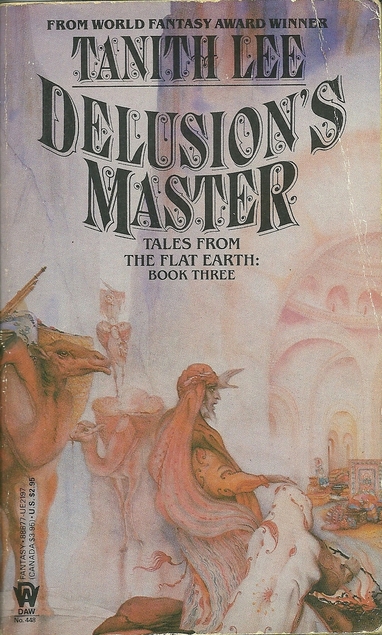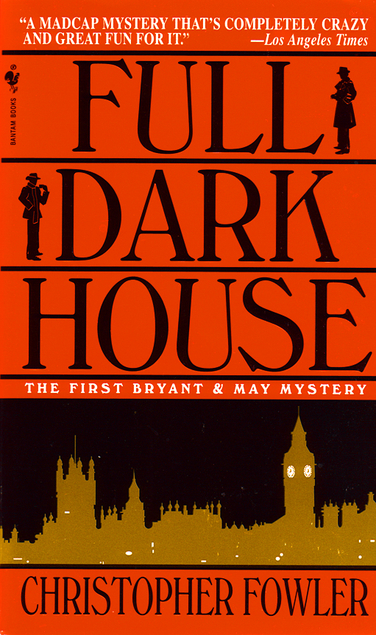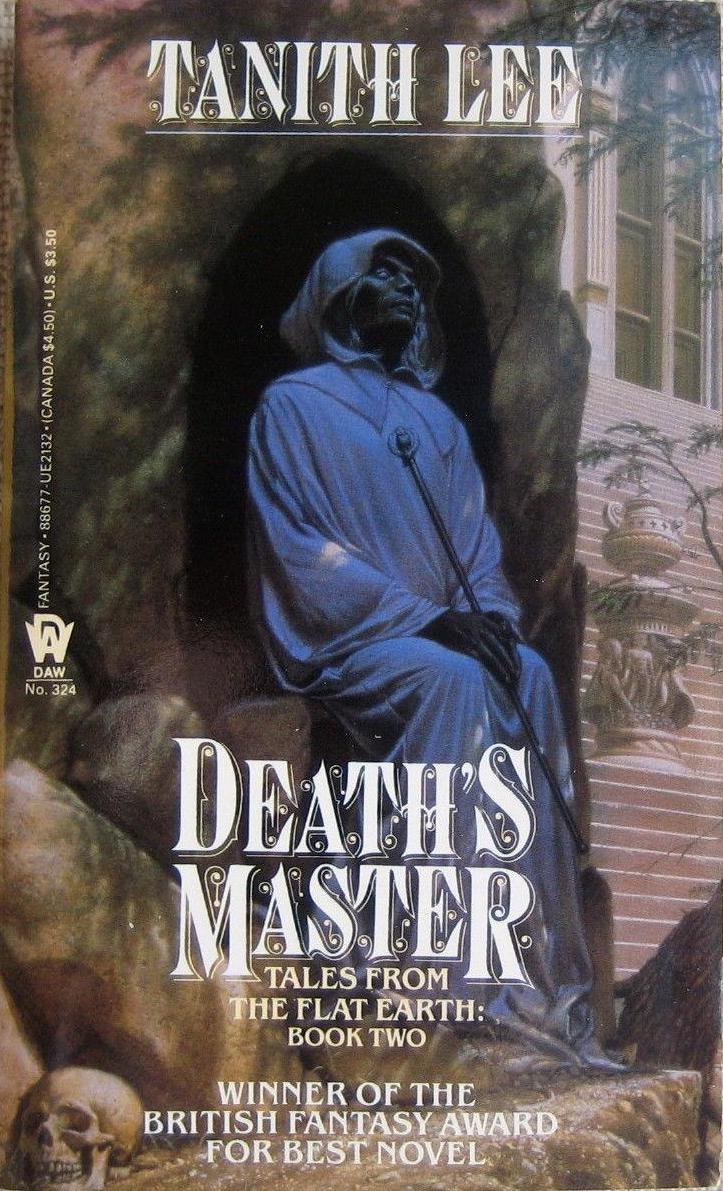A LOVE AFFAIR WITH LITERATURE
I study English literature and read too much. Concise reviews of the ridiculous miscellany of my reading choices. Sometimes also things I watch and listen to. But mostly read.
Saturday, 12 January 2019
Delusion's Master by Tanith Lee
Nothing good can last forever, and sequels or series tend to degrade exponentially as they go on. I was quite let down by this book, after the glories of Night's Master and Death's Master. It's quite good, but it's just not that good. I was happy that the demon prince Azhrarn is still at the centre of the tale, but he was much less interesting in this book. He was delightfully wicked in the first book, but in this one he falls in love randomly with a completely colourless priestess (who might be a magical sun-child, but is also extremely boring) and decides to produce a child, whom he doesn't care about. I kept thinking of this book as an Onion headline, like 'In a Development That Surprises No One, Demon Prince Turns Out to be Terrible Father'. Most of all, I was annoyed that Azhrarn wasn't being evil enough, while Chuz (the lord of insanity) is too straightfowardly evil. My disappointment isn't going to stop me going straight for the next book, in the hope that there will be an improvement, but I have the distinct feeling that this is going to be like watching those shows that you love for the first season, and wondering what the hell you're doing still watching them five series later.
Friday, 11 January 2019
Summer Will Show by Sylvia Townsend Warner
This book reminded me a lot of Tipping the Velvet (unsurprisingly, since Sarah Waters constantly praises Sylvia Townsend Warner), because they're both wonderful historical novels about lesbians (or at least women having a sexual relationship) and are both ruined by the ending, where communism is suddenly the magical solution to everything. I've actually read this novel before, but didn't really appreciate it fully. It's a beautifully written story about a woman who falls in love with her husband's ex-mistress and gets involved in the French Revolution of 1848. Sylvia Townsend Warner has a really fresh, strong and original style, when I'm reading her it feels like she's looking at the world from some angle that no one else can. All the events and people she describes assume a fascinating and unique aspect. She captures character exquitely through the description of gestures, movements, dress, and manner rather than dialogue, which seems almost random at times. I feel like a story about a woman whose children have died and who starts an affair with a Lithuanian Jewish adventuress would have been quite enough material, and I wish there hadn't been all the stuff about the Revolution and communism. I get really bored by novels about political ideology, and personally have no belief in communism. It's unfortunate (for me) that a lot of great women's writing of the early 20th century is often imbued (and, for me, ruined) by communist ideology and various left-leaning political beliefs (South Riding by Winifred Holtby comes to mind). But I really loved the first two-third or so of this novel, the parts that aren't as political and focus more on the relationship between the two female characters and their stories.
Monday, 7 January 2019
The Favourite (dir. Yorgos Lanthimos)
Despite my fondness for TV shows, I go to the cinema about once in an eternity, in fact, I think seeing this film was my first visit in 4 years. Cinemas tend to be too loud and flashy and huge for me, and I'm usually extremely irritated by the formulaic films I see advertised. I know this film had really great reviews, so I decided it was worth a trip, and I wasn't disappointed. I think it's definitely the best movie to come out in the past few years (I haven't actually been able to sit through a newly-released movie in about five years, due to either uncontrollable nausea or boredom). It's a very clever and visually arresting film, it's not something I would watch over dinner or at night for easy entertainment, because it's intellectually challenging and compelling. I loved almost everything about it; the camerawork, the editing, the writing, the acting (Olivia Colman completely deserves all the praise she's receiving), the relationships between the characters. I really loved the disjointed and discontinuous nature of the story, told in almost-disconnected, starkly formatted chunks. I loved the soundtrack, with the nearly-constant baroque music helping produce a dizzying, bizarre atmosphere. The film definitely pays tribute to 80s-90s sophisticated almost-art house period dramas, such as Peter Greenaway's work and Sally Porter's Orlando. The choice of subject (the much-neglected last Stuart Anne) is unusual and works very well in this extremely original film, since it deals with so many unexplored areas of the past. I've seen reviews that complain about the lack of historical accuracy, which I think is a completely ridiculous objection. The film is a sort of fantasy or improvosation on a historical theme, and historical accuracy is far from its objective. There's a dance scene with blatantly 80s or 90s dance moves, no one's actually suggesting that people danced like that in Queen Anne's court. It has a really bleak and odd humour, which made me both laugh and feel extremely uncomfortable, such as the scene in which Abigail's admirer sneaks into her room and she asks if he's come to rape her or seduce her, to which he responds 'I'm a gentleman' and she says 'oh, so it's rape.' One of the central themes of the film, which was extremely well-presented and explored, is the complex interaction between politics, desire and emotion. Sexual desire and power (political and social) are constantly being played off against one another, forming an inextricably tangled web. I have to say that all the positive reviews of this film are richly deserved, and I'm extremely impressed. Also, Emma Stone is officially the first American actress to actually manage an English accent.
Sunday, 30 December 2018
Full Dark House by Christopher Fowler
I found this book on a list of urban fantasy novels, but it's fantasy element is much more minimal than I expected, which annoyed me because I spent the entire book thinking 'okay, is this where the magic happens?' but it never was. I guess it works as a good detective story, but I sort of ruined it for myself by constantly waiting for the fantasy bit to happen. Some parts of it are really violent, which put me off, and I had a hard time getting into it and visualising what was going on. However, it's a pretty clever book, which explores theatre, psychological damage, and the layers of history in London. The solution to the mystery was a bit of a letdown, though it was really grotesque and disturbing. One of the central themes of the book is how London during the Blitz maps onto and compares with present-day London and urban crime. I really liked the connections between the two, and I also enjoyed the relationship (quickly becoming a friendship) of the two central characters, detectives Arthur Bryant and John May. The highly eccentric and socially blundering Bryant was especially endearing, and many parts of it were quite funny. The ending tied the whole story up neatly, and was pretty satisfying. However, much of the plot was unnecessarily meandering, and included a bizarrely improbable red herring that took up way too much space and mental energy. I have no intention of reading any more books in the series, but this one was fairly enjoyable.
The Bishop of Hell and Other Stories by Marjorie Bowen
These are some really delightfully creepy ghost stories, set mostly in the various eras from the 17th to the 19th century. I wouldn't say they're very exceptional, but they're well-written and exciting. They reminded me a lot of Vernon Lee, especially because some of them remain really vague at the end. They also have some of Lee's carefully crafted style. Some of them are not really ghost stories at all, but have explicable solutions, which are still really creepy and horrifying. I don't think Bowen ranks first in early 20th century horror, but she's quite entertaining.
Wednesday, 19 December 2018
The Early Life and Adventures of Sylvia Scarlett by Compton Mackenzie
There's nothing really wrong with this novel, except that it would not stop. It's so long, and there's just too much in there. The plot just rushes on, and there's no sustained mood. I wound up just giving up in despair when I was really close to the end. I've noticed before that Compton Mackenzie does an excellent job of writing female characters (which almost no male writer does), because he actually depicts women as human beings rather than mindless sex objects. Parts of the novel reminded me a lot of Tipping the Velvet because Sylvia is pretty clearly having affairs with women, and moves through different classes exceptionally easily, as the narrator of Tipping the Velvet does, and like, Sylvia is occasionally a performer (a singer in a cabaret). What was interesting to me was how easily Sylvia made friends and moved from one circle to another, forming connections with and affection for a very wide range of characters, some of whom are fairly bizarre, such as an over-zealous and eccentric clergyman and the ex-ballet dancer former mistress of an army captain. Sylvia is also exceptionally mobile for a woman of the time (late Victorian-Edwardian era). Besides travelling all over Europe, she makes it to Africa, South America, the USA, Russia and Eastern Europe (and this is all before I gave up). I always had a vague idea that women at the time couldn't go anywhere further than 10 metres away from their home unaccompanied by a male, but this novel shows how women could be adventurous and independent, travelling very far afield with great ease. But unfortunately, Sylvia contacts typhoid fever in Russia and upon recovery, develops a disgusting religious fervour, and spends forever in metaphysical contemplation, which is incredibly annoying. The book kept me interested when Sylvia's lively personality and wonderful sense of humour were predominant, but after her Easter European religious mania, she suddenly becomes really boring and starts endlessly moralising. It was at that point that I had to chuck it, before Sylvia could find true love in the arms of the rather confusingly personality-less Michael Fane (though I believe Mackenzie wrote other books about him, so I guess he has more substance there). The book is also really frank about sex, and is definitely relevant to studies on sexuality and attitudes towards it at the time.
Monday, 17 December 2018
Death's Master by Tanith Lee
So I loved Night's Master so much that I did what I usually never do and immediately dived into the next book of the series because I was devastated that it was over. This novel won a bunch of awards, but I can't say that it's better than the first novel, it's a natural continuation in terms of style and inventiveness, and I actually think I might have liked the first one better. The main difference between them is that while Night's Master was a series of interconnecting stories, this one more or less follows a single narrative, though it branches off in a million directions and can be very fragmented (in a good way). Since I have something of a preference for the picaresque, I probably enjoyed the separate stories of the first book more, but Tanith Lee does a wonderful job of weaving a complex narrative. I liked the characters in the first book more than the ones in this one, especially because Azhrarn, the demon who is the connecting link of the first book, is so much cooler than Uhlume, the lord of Death, after whom the book is named (maybe). Azhrarn appears in this one too, but I liked it when he did more. The two sort-of-main characters, the magical hemaphrodite Simmu and his/her friend/lover Zhirem, weren't really that interesting. By far the best character in this book was Narasen, a lesbian queen who makes a bargain with death, knows how to hold a grudge and destroy everyone, and winds up by kicking Death out of his own kingdom and living there with her witch lover (who killed her when they were alive). Unfortunately, Narasen appears and disappears throughout the novel, and I would have liked it better if she had been the focus of the whole novel. This book is considerably longer than the first, and I thought some of the parts dragged slightly, like the underwater kingdom. There's just too much of everything sometimes, it's like Tanith Lee was just trying to stuff all of the produce of her clearly overabundant imagination in there. But overall, the book was absolutely amazing. Something that struck me as particularly unusual was the way the characters transform. Normally, character development is combined with some sort of consistency, but Tanith Lee goes absolutely, bizarrely wild on transformations. Characters become the polar opposite of what they were before, they forget their pasts (sometimes by magic, sometimes not), renounce and destroy former lovers. One of the main characters gets physically almost completely obliterated and remade as a demon, and his memory of the past and who he was is completely erased. I think this is a really bold and scary view, in which there is no inner essence, everything is subject to change, and selfhood is radically unstable. I don't think I've ever read a book that goes so far in this direction. I'm torn between grabbing the third book immediately and saving it for later so that I don't exhaust all the delights of this life at once.
Subscribe to:
Comments (Atom)






